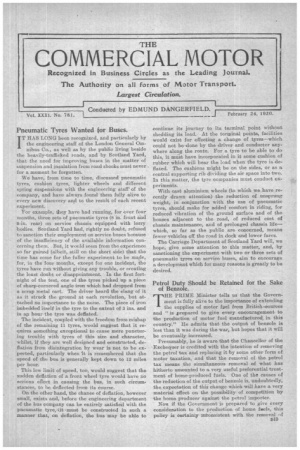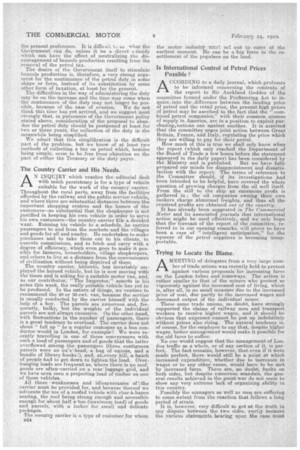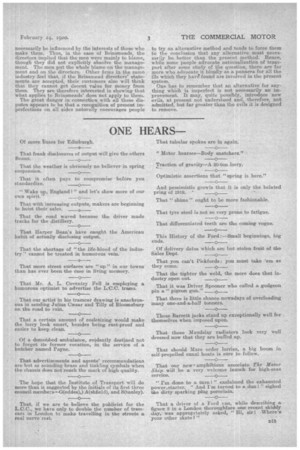Pneumatic Tyres Wanted for Buses.
Page 1

Page 2

Page 3

If you've noticed an error in this article please click here to report it so we can fix it.
IT HAS LONG been recognized, and particularly by the engineering staff of the London General Omnibus Co., as well as by the publics living beside the heavily-trafficked roads, and by Scotland Yard, that the need for improving buses in the matter of suspension and insulation from road shocks must never. for a moment be forgotten. We have, from time to time, discussed pneumatic tyres, cushion tyres, lighter wheels and different spring suspensions with the engineering staff' of the company, and have always found them fully alive to every new discovery and to the result of each recent experiment. For example, diey have had running, for over four months, three sets of pneumatic tyres (8 in, front and 9-in. rear) on service chassis equipped with lorry bodies. Scotland Yard had, rightly no doubt, refused to sanction their employment on service buses because of the insufficiency of the available information con-. cerning them. But, it would seem from the experience so far gained (albeit, still on the short side) that the time has come for the fuller experiment to be made, for, in the four months, except for one incident, the tyres have run without giving any trouble, or creating the least doubt or disappointment. In the first fortnight of the test, one of the tyres picked up a piece of sharp-cornered angle iron which had dropped from a scrap metal cart. The driver heard the clang of it as it struck the •ground at each revolution, but at, tached no importance to the noise. The piece of iron , imbedded itself in the tyre to the extent of 3 ins, and in ap hour the tyre was deflated. The incident, coupled with the freedom from mishap of the remaining 11 tyres, would suggest that it requires something exceptional to cause mere puncturing trouble with tyres of this size and character, whilst, if they are well designed and constructed, deflation from disintegration by wear is not to be expected, particularly when it is remembered that the speed of the bus is generally kept down to 12 miles per hour. This low limit of speed, too, would suggest that the sudden deflation of a front wheel tyre would have no serious effect in causing the bus, in such circumstances, to be deflected from its course. On the oiler hand, the chance of deflation, however small, exists and, before the engineering department of the bus company can be entirely satisfied with the pneumatic tyre, tit 'must be constructed in such a manner that, on deflation, the bus may be able to continue its journey to its terminal point without shedding its load. At the terminal points, facilities would exist for effecting a change of tyres—which could not be-done by the driver and conductor anywhere along the route. For a tyre to be able to do this, it mu.st have incorporated in it some cushion of rubber which will bear the load when the tyre is deflated. The cushions might be on the sides, or as a. central supporting rib dividing the air space into two. In this matter, the tyre companies must conduct experiments. With cast aluminium wheels (to which we have recently drawn attention) the reduction of unsprung weight, in conjunction with the use of pneumatic tyres, should make for added comfort in riding, for reduced vibration of the ground surface and of the houses adjacent to the road, of reduced cost of chassis maintenance, and of prolonged chassis life— which, so far as the public are concerned, means fewer vehicles off the road in dock and lower fares.
The Carriage Department of Scotland Yard will, we hope, give some attention to this matter, and, by sanctioning the experiment with two or three sets of pneumatic tyres on service buses, aim to encourage a development which for many reasons is greatly to be desired.
Petrol Duty Should be Retained for the Sake of Benzole.
HE PRIME Minister tells us that the Government is fully alive to the importance of extending the supplies of motor fnel from British .sources and "is prepared to give every encouragement to the production of motor fuel manufactured, in this country." He admits that the output of henzele is less than it was during the war, but hopes that it will be eventually increased. Presumably, he is aware that the Chancellor of the Exchequer is credited with the intention of removing the petrol tax and replacing it by some other form of motor taxation, and that the removal of the petrol tax means the simultaneous removal of what has hitherto amounted to a very useful preferential treatment of home-produced fuels. One of the causes of the reduction of the output of laenzole is, undoubtedly, the expectation of this change which will have a very material effect on the possibility of competition by the home producer against the petrol importer. Nom if the Government is prepared to give every consideration to the production of home fuels, this policy is certainly' inconsistent with the removal of n13
the present preference. It is difficuLL se what the Government can do, unless it be a 'direct s fosidy, which can have the effect of neutralizing the discouragement of benzoleproduction resulting from the removal of the petrol tax. The desire of the Government itself to stimulate benzole production is, therefore, a very strong argument for the continuance of the petrol duty in some shape or form, instead of its substitution by some other form of taxation, at least for the present. The difficulties in the way of administering the duty may be on the increase and the time may come when the continuance of the duty may net longer be possible, because of the ease of evasion. We do not think this time has yet arrived, and we suggest most strongly that, in pursuance of the Government policy stated above, consideration of the proposal to abandon the petrol duty should be postponed at least for two or three years, the collection of the duty in the meanwhile being simplified. We admit that this• simplification is the difficult part of the problem, but we know of at least two methods of collecting a tax on petrol which, besides being simple, seem to be. free from objection on the part of either the Treasury or the duty payer.
The Country Carrier and His Needs.
AN INQUIRY which Teaches the editorial desk with much persistency is for a type of vehicle suitable for the work of the country carrier. Throughout the rural parts, away from the facilities afforded by the railway and the public service vehicle, and where there are substantial distances between the important shopping centres and the homes of the customers—so substantial that the shopkeeper is not justified in keeping his own vehicle in order to serve
. his own customers—the country carrier fills a decided want. Running his vehicle to a schedule, he carries passengers to and from the markets and the villages and goods for all and sundry. He undertakes to make , purchases and to take them out to his clients, to execute commissions, and to fetch and carry with aa degree of efficiency, which even goes to make it possible for farmers, householders, village shopkeepers, and others to live at a distance from the 'conveniences' of civilization without being deprived of them.
The country carrier, hitherto has invariably employed the horsed vehicle, but he is now moving with the times and is asking for a suitable motor van, and, as our 'contributor, "The Inspector," asserts in his notes this week, the really suitable vehicle has yet to be produced. In the nature of things, we venture to recommend the 20 or 30-ewt. van„ because the service" is usually conducted by the carrier himself with the help of a boy. The parcels are numerous and, frequently, bulky, but the weights of • the individual parcels are not always excessive. On the other hand, with fluctuations in the number of passengers, there is a groat tendency to overload. The carrier does not shout "full up " to a regular customer as a bus conductor would in London, for example! We were recently travelling in one of these conveyances with such a load of passengers and of goods that the latter overflowed among the passengers (three contiguous parcels were an ox'sahead; a . bag of onions, and a bundle of library books !), and, atievery hill, a batch of people had to get down to lighten the load. Overhanging loads are frequent as, where there is no roof, goods are oftenacarried on a rear 'luggage grid, and we have e.ven seen a projecting load of timber on one of these vehicles.
All these 'weaknesses and idiosyncrasies oflthe carrier must be provided for, and because thereof we advocate the use of a roofed vehicle with char-à-banes seating, the roof being strong enough and accessible • enough for about half atom (maximum load) of goods and parcels, with a locker for small and delicate packages. • The country carrier is a type of customer for whom nit the motor industry meat set out to cater at the earliest moment. He can be abig force in the resettlement of the populace on the land.
Is International Control of Petrol Prices Possible ?
ACCORDING to a daily journal, which professes to be informed concerning the contents of the report to Sir Auckland Geddes of the committee formed under the Profiteering Act to inquire into the ,difference between the landing price of petrol and the retail price, the present high prices of petrol may be ascribed to the fact that the " combined petrol companies," with their common sources of supply in America, are in a position to exploit purchasing, nations one against another. It is asserted that the committee urges joint action between Great Britain, France, and Italy, regulating the price which thy are willing to pay for their petrol.
How much of this is true we shall only know when the report (which only reached the Department of the Board of Trade a few hours before the statement appeared in the daily paper) has been considered by the Ministry and is published. But we have fully
prepared our minds for disappointment and dissatisfaction with the report. 'The terms of reference to the Committee should, if its investigations had been intended to be helpful, have covered the whole question of growing charges from the oil well itself. From the still to the ship an enormous profit is gathered in ; the oil companies owning their own tankers charge abnormal freights, and thus all the required profits are obtained out of the country.
It has already been suggested in The Commercial Motor and its associated journals that international action might be used effectively, and we only hope that the forecast of the report of the committee, referred to in our opening remarks, will prove to have been a case of ' intelligent anticipation," for the squeeze of the petrol suppliers is becoming insupportable.
Trying to Locate the Blame.
AMEETING of delegates from a very large number of trade unions was recently held to protest against various proposals for increasing fares on the London tubea and tramways. The action is rather similar to that of the miners who protest so vigorously against the increased cost of living, which is, after all, in no small measure due to the increased price of coal, due partly to the increased wages and decreased output of the individual miner.
These same trade unions, no doubt, have 'strongly supported the claims of railway men and transport workers to receive higher wages, and it should be obvious that expenses cannot be put up indefirlitely without prices also rising. The natural tendency is, of course, for the 'employee to say that, despite higher wages, better management would make it possible for the old fares to suffice.
No one would suggest that the management of London traffic as a whole, or of any section of it, is perfect. The fact remains, however, that even if it were made perfect, there would still be a point at which increased expenditure, whether due to increases in wages or to any other cause, would have to be met by increased faces. There are, no doubt, faults on both sides, but despite numerous scandals, the general results achieved in the great war do not seem to" show any .very extreme lack of organizing ability in this country.
Possibly the managers as well as men are suffering. to some-extent from the reaction that follows a long period of strain. .
It is, however, very difficult to get at the truth in any dispute between the two sides, partly because the various statements , bearing upon the case must necessarily be influenced by the interests of those who make them. Thus, in the ease of Brinsmeads, the directors implied that the men were mainly to blame, though they did not explicitly absolve the management. The men put the whole blame on the management and on the directors. Other firms in the same industry feel that, if the Brinsmead directors' statements are accepted, their customers also will think that they cannot get decent value for money from them. They are therefore interested in showing that what applies to Brinsmeads' does notapply to them. The great danger in-connection with all these disputes appears to be that a recognition of present imperfections on all sides naturally encourages people to try an alternative method and tends to force them to the conclusion that any alternative must necessarily be better than the present method. Hence, while some people advocate nationalization of transport after some study of the question, there are far more who advocate it blindly as a panacea for all the ills which-they have found are involved in the present system. One has to remember that an alternative for anything which is imperfect is not necessarily an improvement. It may, quite possibly, introduce new evils, at present. not understood and, therefore, not admitted, but far greater than the evils it is designed to remoye.




























